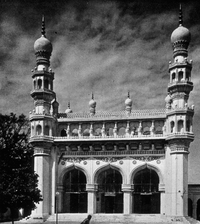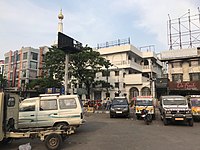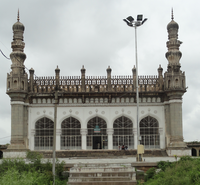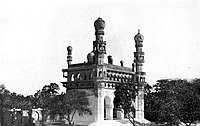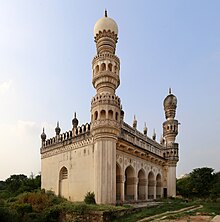
Mosques in Telangana date back to the 14th century. The earliest mosques in the region were built during the short-lived reign of the Delhi Sultanate, established after the defeat of the Kakatiya kingdom. These were often built with the ruins of desecrated Hindu temples, such as the Deval Masjid.
In 1518, Quli Qutb-ul-Mulk established the Qutb Shahi dynasty and rebuilt the fortress of Golconda. He also commissioned the Jama Mosque, which is the oldest surviving mosque in Hyderabad. Successive Qutb Shahi rulers would patronize the construction of several elaborate mosques built in the distinctive style that evolved during this period.
Muhammad Quli Qutb Shah established the city of Hyderabad in 1591, which would grow to encompass Golconda. He built the Charminar as the centerpiece of the city, as well as the Mecca Masjid, which is the largest mosque in the city with a capacity to accommodate 10,000 worshippers. The 17th-century Toli Masjid shows Hindu influences in its ornamentation. Other mosques dating back to the Qutb Shahi period include the mosques at Khairatabad, Hayatnagar, and Musheerabad.
After a brief Mughal rule, the Nizams of Hyderabad ruled modern-day Telangana between 1724 and 1948. Some of the mosques from this period, such as the Afzal Gunj mosque and Chowk Ke Masjid were reminiscent of the Qutb Shahi style. Later mosques showed more cosmopolitan influences, such as the Spanish Mosque, drawing from Moorish architecture.
List of mosques
This is a dynamic list and may never be able to satisfy particular standards for completeness. You can help by adding missing items with reliable sources.References
- Sherwani, Haroon Khan (1974). History of the Qutb Shāhī Dynasty. Munshiram Manoharlal Publishers. p. 46.
- ^ Bilgrami 1927, p. 36–41.
- Yazdani, Ghulam (1918). "Annual Report of the Archaeological Department of His Exalted Highness The Nizam's Dominions" (PDF). Calcutta: Baptist Mission Press. pp. 3–5.
- Jayyusi, Salma K.; Holod, Renata; Petruccioli, Attilio; Raymond, Andre (2008). The City in the Islamic World, Volume 94/1 & 94/2. BRILL. pp. 593, 611–613. ISBN 978-90-04-16240-2.
- Gopalan, Madhumita (24 September 2016). "The Spanish mosque: Moorish architecture in the heart of Hyderabad". The News Minute. Retrieved 22 July 2023.
- Khalidi 2009, p. 56.
- Campbell, Arthur Claude (1898). Glimpses of the Nizams Dominions. p. 216.
- Khan, Ali (12 August 2012). "Masjid-e-Azizia: more than a place of worship". The Siasat Daily – Archive. Retrieved 6 August 2023.
- Bilgrami 1927, p. 107.
- Khalidi 2009, p. 55.
- Bilgrami 1927, p. 55–58.
- Khalidi 2009, p. 48.
- Bilgrami 1927, p. 166-168.
- Bilgrami 1927, p. 110-112.
- Bilgrami 1927, p. 26–29.
- Khalidi 2009, p. 40.
- Bilgrami 1927, p. 96–98.
- Khalidi 2009, p. 54.
- Bilgrami 1927, p. 57-58.
- Khalidi 2009, p. 49.
- Bilgrami 1927, p. 144–146.
- Khalidi 2009, p. 47.
- Khalidi 2009, p. 44.
- Bilgrami 1927, pp. 53–55.
- Sur, Aihik (26 December 2019). "Heritage mosque in frail shape due to financial crisis". The New Indian Express. Retrieved 22 July 2023.
- Khalidi 2009, p. 51.
- Khalidi 2009, p. 41.
- Bilgrami 1927, pp. 78–88.
- Khalidi 2009, p. 42.
- Bilgrami 1927, pp. 93–94.
- Khalidi 2009, p. 52.
- Nayeem, M. A. (2006). The Heritage of the Qutb Shahis of Golconda and Hyderabad. p. 175.
- Yazdani, Ghulam (1926). Report of the Archaeological Department of His Exalted Highness The Nizam's Dominions (PDF). Calcutta: Baptist Mission Press.
- Bilgrami 1927, pp. 31–32.
- "Governor and CM inaugurate temple, masjid and church constructed in the Secretariat complex". The Hindu. 25 August 2023. ISSN 0971-751X. Retrieved 10 December 2024.
- Khalidi 2009, p. 59.
- Moin, Ather (3 October 2019). "Hyderabad: Century-old Shahi Masjid under threat". Deccan Chronicle. Retrieved 22 July 2023.
- Khalidi 2009, p. 57.
- Bhavani, Divya Kala (16 August 2018). "Hyderabad's Spanish mosque: A serene place of worship and acceptance". The Hindu. ISSN 0971-751X. Retrieved 22 July 2023.
- Bilgrami 1927, pp. 65–67.
- Khalidi 2009, p. 43.
Bibliography
- Khalidi, Omar (2009). A Guide to Architecture in Hyderabad, Deccan, India (PDF). Archived from the original (PDF) on 13 March 2020.
- Bilgrami, Syed Ali Asgar (1927). Landmarks of the Deccan. Government Central Press.
| Hyderabad topics | |||||||||||
|---|---|---|---|---|---|---|---|---|---|---|---|
| History | |||||||||||
| Government | |||||||||||
| Public buildings | |||||||||||
| Tourist attractions |
| ||||||||||
| Education | |||||||||||
| Higher education |
| ||||||||||
| Healthcare | |||||||||||
| Industry | |||||||||||
| Transport |
| ||||||||||
| Culture | |||||||||||
| Water bodies in and around Hyderabad | |||||||||||
| National parks around Hyderabad | |||||||||||
| Monuments and memorials | |||||||||||
| Sport |
| ||||||||||
| Other topics | |||||||||||
